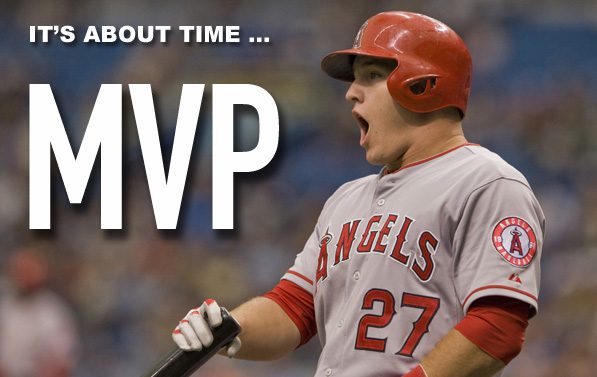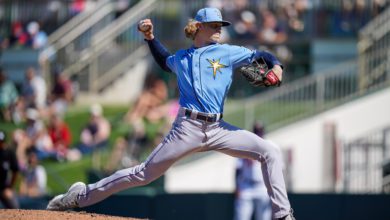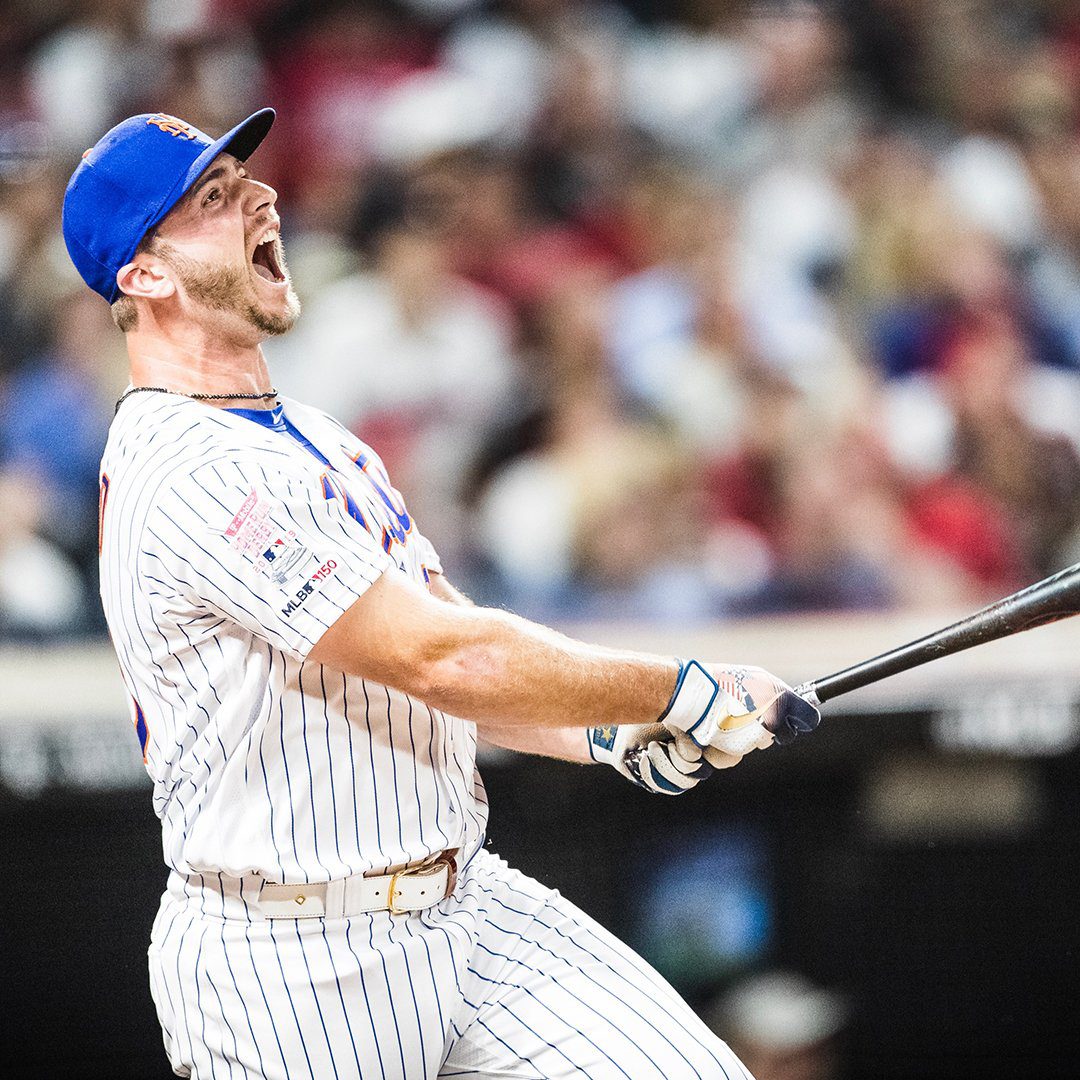

 There’s still over a week left to play in the season, and in a situation that departing commissioner Bud Selig previously could only dare imagine in his wildest of dreams, all four wild card spots and three of the six division winners are still up for grabs.
There’s still over a week left to play in the season, and in a situation that departing commissioner Bud Selig previously could only dare imagine in his wildest of dreams, all four wild card spots and three of the six division winners are still up for grabs.
Eight teams vying for six spots should keep fans of those teams glued to their seats while fans of the 20 teams not playing in October can only lick their wounds and talk about what might have been if (team’s top player) didn’t get hurt or (team’s incompetent manager) hadn’t been incompetent.
As usual, I’m not going to bother waiting until the end of the season to decide who should win baseball’s major awards. Normally this is no big deal because, with this little time left, there’s not really anything that can happen that would change how I feel. However, this year, some of the award races are really close, and it could be something as slight as a game pitched on the last day of the season that determines the winner.
But, here’s the straight poop: It doesn’t really matter because I don’t have a vote, and even if I did, I don’t have all the votes. The baseball writers are going to vote for the 2014 MLB MVP and Cy Young Awards the way they each feel is right – no matter how wrong they are. They’ll value the arbitrary player contributions they feel are most important in considering these awards that are arbitrary in their own right.
Some voters have embraced the new statistical measurements that almost every team uses to accurately judge and predict player performance. A notable exception are the Philadelphia Phillies whose love of “gut feels” and “hunches,” coupled with their fear of “statistics,” now have one of the highest payrolls in baseball to go along with their wide variety of stinky major league and minor league teams.
Most voters have chosen to stick with the tried and true statistics they’ve been using since they began following the game, and they won’t let anything like “mathematics” take away from their absolute certainty in their own righteousness. It’s a really healthy mental attitude to have. I get it. It’s simpler. And it’s nice to have something old-fashioned you can cling to in a world that seems to be advancing technologically every day.
The “counting stats” in baseball – statistics that are “counted” (accumulated) over a season, like runs, hits, home runs and would not include statistics like batting average – have been used for decades by writers and fans to determine the awards process because they can be a quick-look guide to compare player production.
The counting stats do have some value, but there are other more advanced statistics that tell us better how well a player has performed in all aspects of the game. If he scores 100 runs, that’s great. But in most cases someone else was responsible for making him score, so we can’t really give a single player all the credit for scoring a run. However, we can give him all the credit for getting on base in the first place.
When it comes to the season awards, there are only four that anyone cares about: the AL and the NL Most Valuable Player Award and the AL and the NL Cy Young Award for the best pitcher. The other awards, like for Rookie, Manager, Comeback Player and Not Absolute Worst Umpire, are interesting but we’ll leave those for another column by another writer (possibly on another site).
Every year, as with any arbitrarily assigned award system, who should win and who will win hardly ever match up. Many talented actors and actresses have never won awards for their performances and yet, Christina Applegate has been nominated four times for an Emmy Award and even won once. Yes, an Emmy Award for acting … up against other actresses who weren’t Christina Applegate!
How does something ridiculous like this happen? Sometimes people have other agendas or they are voting based on sympathy or popularity. Let’s say the actress just happens to be a recent breast cancer survivor who isn’t a very good actress (*cough* Christina Applegate) but gets votes because people feel sorry for her and hope that an award win will keep that cancer in remission, even though I think we all know there’s no proven connection between winning awards and beating cancer.
Sometimes people just have oatmeal for brains when they’re voting. There are no rules about voting for these awards other than who qualifies for them. And as with most things in America, there’s no penalty for being stupid.
Anyway, let’s bang these out. In addition to explaining how my choices are right and how everyone else’s choices are wrong, I will also be making up new nicknames for all of this year’s choices. Because this is important.
For the record, I’m using www.FanGraphs.com for all the conventional and advanced statistical data – and also my eyeballs and ear-holes which I use to perceive things.
American League Cy Young
Last season, this award was a slam-dunk win for Detroit’s Max Scherzer. He led the league in just about every statistical category for pitchers. Sticking with the basketball metaphors, the choice is no layup this year. It’s been a fast-break year for pitching in the American League with nine of the top 10 pitchers.
You could make a full-court press argument for about five different guys to win this award, but it looks like it’s going to come down to a one-on-one between the Seattle Mariners’ fan-favorite Felix Hernandez and the Cleveland Indians’ little-known Corey Kluber.
Their numbers are almost even so far, with Kluber currently having a slight advantage, but with the shot clock winding down and the Indians falling out of the playoffs, the team might shut him down at some point, and with the Mariners still in the playoff hunt, Felix will have the opportunity for a buzzer-beater.
If Seattle runs the floor hard and makes the playoffs, the award voters will probably proclaim that Felix was better than Corey because, regardless of actual player performance, the most important skill a player needs is “having a better team.”
And the award goes to … Corey “Coulda Been on the Angels” Kluber.
American League MVP
Well, this is going to be a chip-in (Haha! I switched to golf!). Once again, the league’s best player is Mike Trout. And Miguel Cabrera isn’t around to steal the MVP Award from Trout this year. As a matter of fact, Miggy is still replacing divots on the fairway and isn’t even in the top 10 in the American League this year. Oddly, this isn’t even Trout’s best year, but he also now has the added advantage of having teammates playing above par. As before, voters love players who have great teams.
Josh Donaldson of the Oakland A’s put up another very nice year, even with his team stuck in a sand trap this last month. The Kansas City Royals’ Alex Gordon had some good offensive numbers to go with his mind-boggling defensive contributions. This guy was dumped in the outfield because he just couldn’t handle third base and now is one of the best defensive outfielders of the last decade.
The Indians’ Michael Brantley deserves a little mention here as well. In a Trout-free world, he would certainly be in the discussion. He’s had a breakout year and has become Cleveland’s Double Eagle (okay, admittedly these metaphors are getting thin).
And the award goes to … Mike “F U Miggy” Trout.
National League Cy Young
What Trout is to the AL MVP Award, Clayton Kershaw is to the NL Cy Young Award. He’s the Hairpin Net Shot (Boom! Badminton metaphor!) of pitchers. This guy is a Smash from the Baseline to the Forecourt. Am I right?!?
Even with missing a few weeks early in the season, it’s not at all close, so I’m not going to bother naming any other players. It would just be disrespectful. What this guy does with his shuttlecock is so far above what everyone else is doing that after playing against him, the Royals’ Eric Hosmer was asked about Kershaw’s new $215 million contract and responded with: “I don’t think he got enough money.”
And the award goes to … Clayton “Kill Shot” Kershaw.
National League MVP
Last year, the winner of this award could’ve been any number of guys who had very good years for their teams. There was no clear-cut choice, and it was quite a Scrum (Kazaam! Rugby!). This year, we have the same scenario playing out on the Pitch (rugby pitch, not baseball pitch).
This award was Troy Tulowitzki’s to lose – after three months, he could’ve just walked it into the Try Zone (don’t worry, I’m not sure what these rugby terms mean either). He was doing what he does so well: great offense and exceptional defense at shortstop. Unfortunately, he also did the other thing he’s very good at: getting injured. That took him out of the award hunt and into the Touch.
Then I thought the Miami Marlins’ Giancarlo Stanton was going to be the guy. His impressive offensive numbers set him apart like something in rugby that would indicate someone setting himself apart. In an era when home runs are becoming more and more rare because squares won’t let the players “juice up,” he had 20 percent more home runs than the next guy. Giancarlo was then hit in the face with a baseball and he’s done for the season. A real Knock On.
So that leaves us with Jonathan Lucroy, Anthony Rendon, Andrew McCutchen, Buster Posey, and Carlos Gomez – all having very good years, but not a single great year among them, and it’s a real Ruck (which I think is similar to a scrum). Oh, I guess Clayton Kershaw, too – even though I’m not a big fan of pitchers winning this award, but he’ll help bring some order to this Maul (last ruby term, I swear).
And the award goes to … Clayton “Sure, I Guess” Kershaw.
If these choices I’ve made here make you angry and you are flabbergasted that I would pick Player A over Player B for the Cy Young, or that I had the audacity to not even mention Player X in the MVP race, then please comment below and explain to me why I’m wrong.
But please keep in mind that 1) I was nice enough to leave curling metaphors out of this column, 2) these awards are arbitrary, though you are probably wrong, and 3) please don’t use 1,800 words like me, Jed “The Pig-Headed, Self-Righteous, Know-it-All Sports Writer” Rigney.





